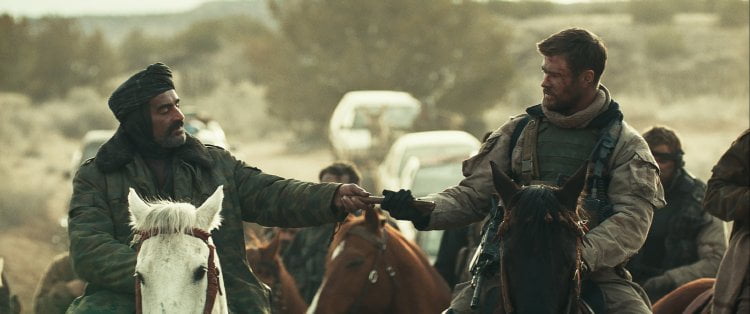12 Strong

After two years training a U.S. Army’s Special Forces’ team, Captain Mitch Nelson (Chris Hemsworth) was settling in with his family after transferring to a desk job. On 9/11, he immediately regretted that decision. With some help from his Chief Warrant Officer Hal Spencer (Michael Shannon), Nelson got his team back. They became the first men on the ground to not only fight the Taliban in unfamiliar territory, but to ally and attempt diplomacy with General Abdul Rashid Dostum (Navid Negahban, "American Assassin") one of the three leaders of Afghanistan's squabbling Northern Alliance in "12 Strong."
Laura's Review: B
In France, those admitted involuntarily into psychiatric hospitals must be presented to a freedom and detention judge within "12 Days." Photojournalist/documentarian Raymond Depardon has secured incredibly intimate access to numerous hearings with patients suffering a multitude of disorders appearing before either one of two female or one of two male judges. Depardon's fly-on-the-wall approach suggests Frederick Wiseman with fewer cutaways and a more limited focus. The film is fascinating, but leaves us with many questions unanswered. Depardon begins with the Foucault quote 'The path from man to true man goes by way of madman,' then an establishing shot that creeps its way down gleaming hospital corridors. He then jumps into a series of hearings, only occasionally broken up with location shots. We hear from a young man who admits punching a stranger in the head was wrong, but that he believes his psychoses can be controlled with outpatient treatment, a common plea. There is a rape survivor who copes with cutting, a suicidal young woman who sees no value in treatment as she is determined to end her life and a disoriented Muslim who stole (or believes he stole) a Kalashnikov from his 'extremist neighbor.' Some of these patients are there via criminal court proceedings, like one man who seems pretty reasonable until he states that the judge should check with Bernie Sanders about the validity of the political party he intends to launch. When he leaves the room, we learn that his father, who he also had asked be contacted, was murdered by his own hand. We feel for one female judge presented with a woman who insists her lawyer speak for her, then launches into a rushed and robotic plea for visitation rights with her child, something which her psychiatrist has recommended against yet something which is clearly causing both anguish. All are treated with dignity and respect. Not a single case in the film is decided in the patient's favor (although one woman declares she wishes to remain hospitalized), the judges essentially rubber stamping psychiatric recommendations. The judges frequently state that they are not doctors and are there to ensure the process is being correctly followed, but one wonders just how much latitude they have and when they might see fit to exercise it. Those denied freedom are told they may appeal the decision, but we are not shown the appeals process and one patient declares that it is not worth their time as the appeal will be denied, a statement both the judge and patient lawyer agree with. Still, one must compare France's method with that of the U.S., where many of these types of patients are dumped on the streets by hospitals. What the documentary does answer is how tricky it can be to determine mental illness, many patients appearing normal until a strange non sequitur or revealing comment is made. Depardon breaks from these sessions a few times, revealing the incarcerated in their fenced in outdoor spaces or tracking to the closed door of a hospital 'comfort room,' the voice emerging calling for a doctor to help with the demons holding her down. Composer Alexander Desplat's score does not emerge until the film is winding down, piano and violin accompanying shots around the hospital grounds. Depardon closes with slow, tracking exterior shots shrouded in fog, an apt metaphor for his subject. Grade:
Robin's Review: DNS
DNS

